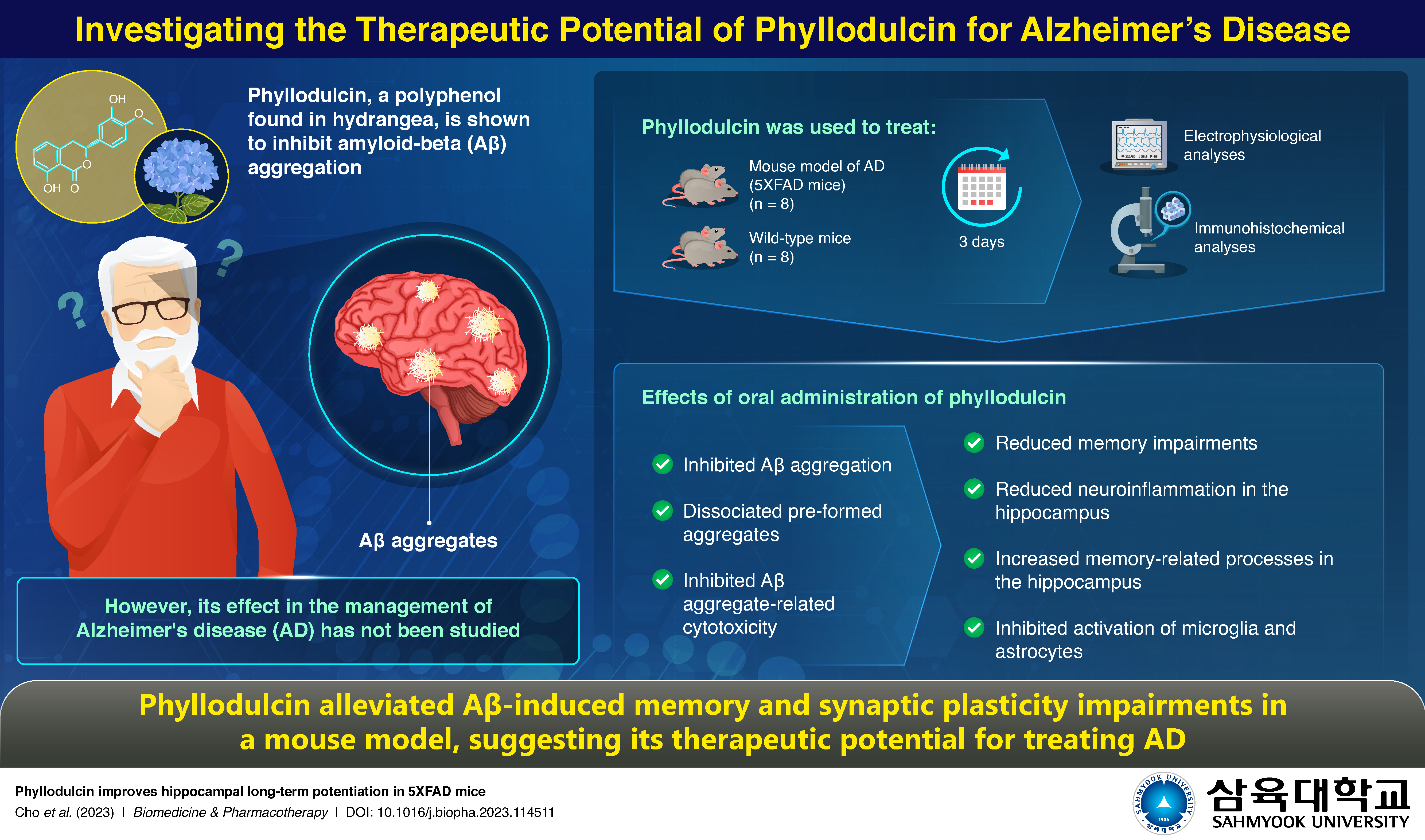Phyllodulcin Could be a Potential Candidate for Treating Alzheimer’s Disease, Find Sahmyook University Researchers
2023-07-25 3,246
The natural sweetener found in hydrangeas inhibited amyloid β aggregation and dissociated its aggregates in an animal model study
Amyloid β aggregation is primarily responsible for the development of Alzheimer’s disease (AD). In a new mouse model study, researchers investigate the effect of phyllodulcin—a natural sweetener found in hydrangea—in inhibiting Aβ accumulation. The results suggest that phyllodulcin effectively inhibits Aβ accumulation and decomposes the pre-aggregated Aβ, suggesting its beneficial role in treating AD. Going ahead, these results can provide important clues for the development of effective treatment for AD.

Alzheimer’s disease (AD) is the most common neurodegenerative disorder in the world, associated with symptoms like memory loss and cognitive impairment. Brain lesions caused by the aggregation of amyloid β (Aβ) and neurofibrillary tangles are believed to be the main cause of AD. Therefore, therapeutic agents that control Aβ aggregation may be useful in delaying the onset and progression of AD.
While many drugs targeting Aβ have been developed, they have failed to demonstrate efficacy in clinical trial studies. Moreover, the use of approved antibody drugs is associated with high costs of treatment and uncertain efficacy. Therefore, developing a simple and efficient drug that targets Aβ for the treatment of AD is needed.
One such therapeutic agent could be phyllodulcin, a natural sweetening agent found in Hydrangea macrophylla var. thunbergia. Previous studies have shown that phyllodulcin, a type of polyphenol, can efficiently penetrate the blood-brain barrier and get uniformly distributed in the brain. Moreover, recent research also suggests that polyphenols can inhibit Aβ aggregation. However, the role of phyllodulcin for the management of AD has not been studied.
To fill this knowledge gap, Assistant Professor Se Jin Jeon of the Department of Integrative Biotechnology, College of Science and Technology, Sahmyook University, along with a group of researchers from Korea, studied the effect of phyllodulcin on Aβ aggregation and various pathological features in an animal model of AD. The findings of their study were published online on 11 March, 2023 in Volume 161 of Biomedicine & Pharmacotherapy journal.
Speaking about the rationale behind this study, Assistant Professor Jeon says, “We focused on increasing the level of evidence regarding phyllodulcin by using various experimental techniques. We hypothesized that phyllodulcin may enter the brain and inhibit Aβ aggregation, resulting in the improvement of various brain lesions appearing in AD. To examine our hypothesis, we investigated the effect of phyllodulcin on the Aβ aggregation and various pathological hallmarks in an animal model of AD.”
The researchers demonstrated that phyllodulcin could efficiently inhibit Aβ aggregation as well as decompose pre-aggregated Aβ clumps, both in in vivo (cells) and in vitro (animal model) experiments. Moreover, a toxicity assay revealed that phyllodulcin prevents Aβ-induced neurotoxicity and attributed this to the reduced Aβ aggregates.
For the in vivo experiments, the researchers used male 5XFAD mice (a strain of transgenic mice) for creating AD model and wild-type mice. They were orally administered with either phyllodulcin or control drug, once every three days for a month. The mice were then subjected to electrophysical and immunohistochemical analyses. The results revealed that phyllodulcin reduced the memory impairments caused by the accumulation of amyloid proteins.
The hippocampus is the site for memory formation, which is inhibited by Aβ clumps in AD, leading to memory loss. Interestingly, the experiments revealed that phyllodulcin could counter this effect by reducing the deposition of Aβ in the hippocampus and increasing memory-related processes. Additionally, it also minimized neuroinflammation in the hippocampus and inhibited the activation of microglia and astrocytes (cells responsible for playing a key role in neuroinflammation in the pathology of AD).
Elaborating further on these findings, Assistant Professor Jeon says, “Our study is the first to report that phyllodulcin can modify the underlying pathogenesis of Alzheimer’s disease, suggesting the possibility of preventing dementia or delaying the progression of the disease.” Adding further, Assistant Professor Jeon says, “It will take more than 20 years to develop a treatment, but at this stage, the results of this study can be used to provide a guide map that can help prevent or improve dementia symptoms.”
Here’s hoping that the efforts of this study help in realizing the great promise of treatment shown by this natural sweetener for the management of AD.
Reference
Title of original paper: Phyllodulcin improves hippocampal long-term potentiation in 5XFAD mice
Journal: Biomedicine & Pharmacotherapy
DOI: 10.1016/j.biopha.2023.114511
About the Institute
Sahmyook University is situated in metropolitan Seoul, South Korea. The university is renowned for its pristine campus, earning the title of "Korea's most beautiful university." Its commitment to environmental sustainability is reflected in its eco-friendly construction. The university prides itself on its unique holistic academic counselling system in which students and professors organically work together in receiving and giving guidance. Comprising six colleges, including the College of Theology, Humanities & Social Science, and Health Science & Social Welfare, as well as four graduate schools, Sahmyook University provides a comprehensive educational experience.
Website: https://www.syu.ac.kr/eng/
About Assistant Professor Se Jin Jeon
Dr. Se Jin Jeon received a Ph.D. in Pharmacology from Seoul National University and completed her postdoctoral training at the University of California, Los Angeles, USA. Currently, she is teaching pharmacology and new drug development as an assistant professor at the Department of Bio Convergence Engineering at Sahmyook University in South Korea. Dr. Jeon has published more than 85 papers till date on various topics including neuroinflammation, signaling, neuroprotection, brain diseases, and molecular neuroscience.
Amyloid β aggregation is primarily responsible for the development of Alzheimer’s disease (AD). In a new mouse model study, researchers investigate the effect of phyllodulcin—a natural sweetener found in hydrangea—in inhibiting Aβ accumulation. The results suggest that phyllodulcin effectively inhibits Aβ accumulation and decomposes the pre-aggregated Aβ, suggesting its beneficial role in treating AD. Going ahead, these results can provide important clues for the development of effective treatment for AD.

Alzheimer’s disease (AD) is the most common neurodegenerative disorder in the world, associated with symptoms like memory loss and cognitive impairment. Brain lesions caused by the aggregation of amyloid β (Aβ) and neurofibrillary tangles are believed to be the main cause of AD. Therefore, therapeutic agents that control Aβ aggregation may be useful in delaying the onset and progression of AD.
While many drugs targeting Aβ have been developed, they have failed to demonstrate efficacy in clinical trial studies. Moreover, the use of approved antibody drugs is associated with high costs of treatment and uncertain efficacy. Therefore, developing a simple and efficient drug that targets Aβ for the treatment of AD is needed.
One such therapeutic agent could be phyllodulcin, a natural sweetening agent found in Hydrangea macrophylla var. thunbergia. Previous studies have shown that phyllodulcin, a type of polyphenol, can efficiently penetrate the blood-brain barrier and get uniformly distributed in the brain. Moreover, recent research also suggests that polyphenols can inhibit Aβ aggregation. However, the role of phyllodulcin for the management of AD has not been studied.
To fill this knowledge gap, Assistant Professor Se Jin Jeon of the Department of Integrative Biotechnology, College of Science and Technology, Sahmyook University, along with a group of researchers from Korea, studied the effect of phyllodulcin on Aβ aggregation and various pathological features in an animal model of AD. The findings of their study were published online on 11 March, 2023 in Volume 161 of Biomedicine & Pharmacotherapy journal.
Speaking about the rationale behind this study, Assistant Professor Jeon says, “We focused on increasing the level of evidence regarding phyllodulcin by using various experimental techniques. We hypothesized that phyllodulcin may enter the brain and inhibit Aβ aggregation, resulting in the improvement of various brain lesions appearing in AD. To examine our hypothesis, we investigated the effect of phyllodulcin on the Aβ aggregation and various pathological hallmarks in an animal model of AD.”
The researchers demonstrated that phyllodulcin could efficiently inhibit Aβ aggregation as well as decompose pre-aggregated Aβ clumps, both in in vivo (cells) and in vitro (animal model) experiments. Moreover, a toxicity assay revealed that phyllodulcin prevents Aβ-induced neurotoxicity and attributed this to the reduced Aβ aggregates.
For the in vivo experiments, the researchers used male 5XFAD mice (a strain of transgenic mice) for creating AD model and wild-type mice. They were orally administered with either phyllodulcin or control drug, once every three days for a month. The mice were then subjected to electrophysical and immunohistochemical analyses. The results revealed that phyllodulcin reduced the memory impairments caused by the accumulation of amyloid proteins.
The hippocampus is the site for memory formation, which is inhibited by Aβ clumps in AD, leading to memory loss. Interestingly, the experiments revealed that phyllodulcin could counter this effect by reducing the deposition of Aβ in the hippocampus and increasing memory-related processes. Additionally, it also minimized neuroinflammation in the hippocampus and inhibited the activation of microglia and astrocytes (cells responsible for playing a key role in neuroinflammation in the pathology of AD).
Elaborating further on these findings, Assistant Professor Jeon says, “Our study is the first to report that phyllodulcin can modify the underlying pathogenesis of Alzheimer’s disease, suggesting the possibility of preventing dementia or delaying the progression of the disease.” Adding further, Assistant Professor Jeon says, “It will take more than 20 years to develop a treatment, but at this stage, the results of this study can be used to provide a guide map that can help prevent or improve dementia symptoms.”
Here’s hoping that the efforts of this study help in realizing the great promise of treatment shown by this natural sweetener for the management of AD.
Reference
Title of original paper: Phyllodulcin improves hippocampal long-term potentiation in 5XFAD mice
Journal: Biomedicine & Pharmacotherapy
DOI: 10.1016/j.biopha.2023.114511
About the Institute
Sahmyook University is situated in metropolitan Seoul, South Korea. The university is renowned for its pristine campus, earning the title of "Korea's most beautiful university." Its commitment to environmental sustainability is reflected in its eco-friendly construction. The university prides itself on its unique holistic academic counselling system in which students and professors organically work together in receiving and giving guidance. Comprising six colleges, including the College of Theology, Humanities & Social Science, and Health Science & Social Welfare, as well as four graduate schools, Sahmyook University provides a comprehensive educational experience.
Website: https://www.syu.ac.kr/eng/
About Assistant Professor Se Jin Jeon
Dr. Se Jin Jeon received a Ph.D. in Pharmacology from Seoul National University and completed her postdoctoral training at the University of California, Los Angeles, USA. Currently, she is teaching pharmacology and new drug development as an assistant professor at the Department of Bio Convergence Engineering at Sahmyook University in South Korea. Dr. Jeon has published more than 85 papers till date on various topics including neuroinflammation, signaling, neuroprotection, brain diseases, and molecular neuroscience.


